by Jim Brummett | Apr 10, 2020 | Devotions
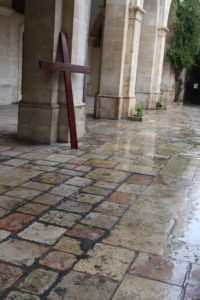 Friday of Holy Week was a day of death. Early Friday morning, Judas, overcome with remorse for betraying our Lord, hanged himself.
Friday of Holy Week was a day of death. Early Friday morning, Judas, overcome with remorse for betraying our Lord, hanged himself.
By 9am, Jesus had been falsely accused, condemned, mocked, beaten and abandoned. Soldiers spit on Him, tormented Him, and pierced His head with a crown of thorns. He was sentenced to death by crucifixion, one of the most horrible and disgraceful methods of capital punishment known at the time. He carried His own cross to Calvary where He was again mocked & insulted as Roman soldiers nailed Him to a wooden cross. Jesus’ first words on the cross: “Father, forgive them, for they do not know what they are doing” (Lk. 23:34 NV). His last words were “Father, into your hands I commit my spirit” (Lk. 23:46). By 3:00, He died. Around 6pm, Nicodemus & Joseph of Arimathea took Jesus’ body down from the cross and lay it in the tomb.
Let’s sing: “At the cross, at the cross, I surrender my life, I’m in awe of You, I’m in awe of You. Where Your love ran red and my sin washed white, I owe all to You, I owe all to You, Jesus.”
Scripture reading for Friday: Matthew 27:1-62, Mark 15:1-47, Luke 22:63-23:56, and John 18:28-19:37.
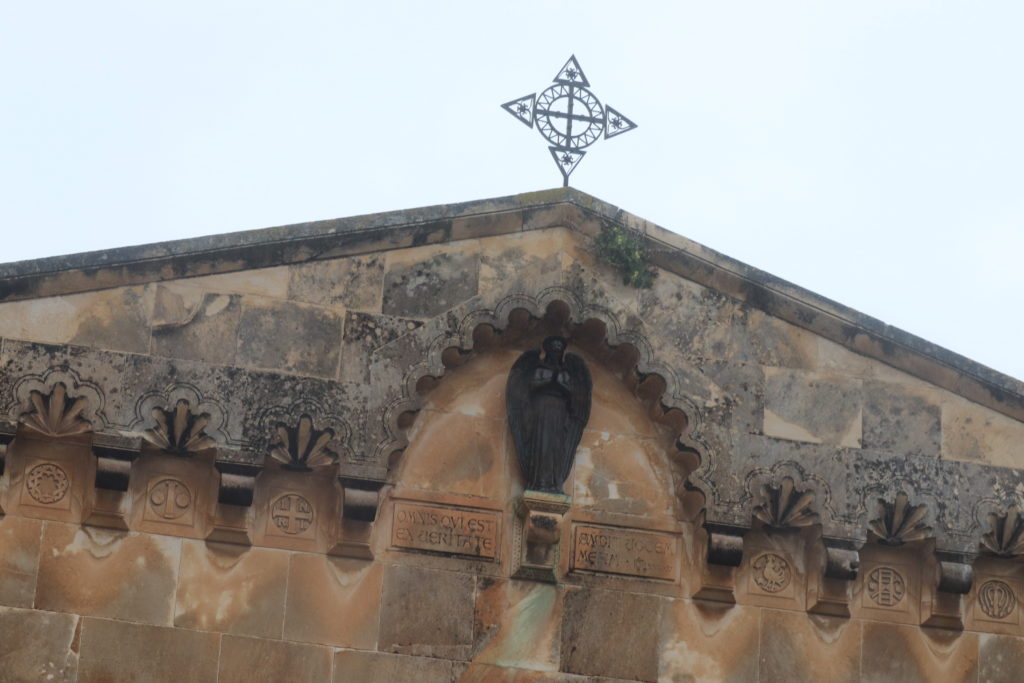
(Jerusalem) The Church of the Flagellation is a Roman Catholic church and Christian pilgrimage site located in the Muslim Quarter of the Old City of Jerusalem, Lions, Gate. This church marks the Second Station of the Cross and spot where Jesus Christ was flogged by Roman soldiers before his journey down the Via Dolorosa to Calvary. (Photo March 2020, Gina Brummett)
by Jim Brummett | Apr 9, 2020 | Devotions
Thursday of Holy Week was a day of agony for our Lord. The day started with him sending two of his disciples to prepare the upper room in Jerusalem for the Passover meal. In the evening He took a towel and basin and washed the feet of his disciples, demonstrating how believers should humble themselves and love one another. He shared the feast of Passover with disciples. As the Lamb of God, He was fulfilling the meaning of Passover by giving his body to be broken and blood to be shed in sacrifice, freeing us from sin and death. He instructed His followers to continually remember His sacrifice by sharing elements of bread and wine.
.After dinner he led the disciples into the Garden of Gethsemane at the Mount of Olives where He prayed. Luke 22:44 states that as He prayed “his sweat became like great drops of blood falling down to the ground.” His time of prayer was interrupted when Judas and a mob armed with swords and clubs, sent by the chief priests and elders of the people came and arrested him. He was taken to the home of Caiaphas the high priest where members of the Sanhedrin gathered to bring their accusations against him. There are twelve reasons why his arrest, trial and conviction were illegal.
- He was arrested without any formal charges presented against him.
- His trial was at night, when the law required it to be held during daylight.
- The Jewish law prohibited the Sanhedrin from originating changes.
- No witnesses were permitted to testify on his behalf.
- Jewish law did not permit the trial of a capital offense to begin on the day before the annual Sabbath of the Feast of Unleavened Bread.
- His trial was concluded in one day, when Jewish law stated that if a sentence of death was to be pronounced, the case cannot be concluded before the following day.
- Two false witnesses charged him with saying he would destroy the temple made with hands, yet the court condemned him on another false charge – blasphemy. According to the Jewish law, a person could not be condemned on his own testimony.
- The merits of His defense were not considered. Instead, the court pronounced sentence instantly and unanimously.
- Members of the court made sure the trial was completed before members like Joseph of Arimathea who would have voted against condemnation were present.
- The sentence was pronounced in the home of the high priest, when the law stated a death sentence could be pronounced only in the court’s appointed place.
- Most of the judges were known enemies of Jesus, when Jewish law called for judges to be impartial.
- The court legally switched the charges from blasphemy to treason before Pilate, a Roman crime, so the Romans would be responsible for his death. No evidence of treason was presented.
It was the immeasurable love of Christ that drove Him through the day of agony. I love, He washed the feet of the one who would betray him, and the one who would deny him. In love He gave himself over to the sentence of death, to die for the sins of all men including those who worked feverishly to have him killed. He was driven by His love for you and me.
Let’s sing: “For me it was in the Garden, He prayed “Not my will but Thine.” He had no tears for His own griefs but sweat drops of blood for mine. How marvelous, how wonderful! And my song shall ever be. How marvelous, how wonderful, is my Savior’s love for me.”
Scripture reading for Thursday: Matthew 26:17–75, Mark 14:12-72, Luke 22:7-62, and John 13:1-38.
by Jim Brummett | Apr 7, 2020 | Devotions
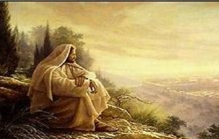 On Tuesday of Holy Week, Jesus returned to Jerusalem, passed the withered fig tree and used it as an illustration of the power of placing our faith in God. When they returned to the Temple, religious leaders publicly challenged him, asking “By what authority are you doing these (miracles)? And who gave you this authority?” (Matthew 21:23). That conversation did not go well for the leaders, as Jesus called them “blind guides…whitewashed tombs full of dead people’s bones and all sorts of impurity, filled with hypocrisy and lawlessness…” (23:24-33). Notice, He did not try to defend himself nor give credence to his critics. There is probably a lesson there for us today. A little while later that day, Judas negotiated with the Sanhedrin to betray Jesus (Matthew 26:14-16).
On Tuesday of Holy Week, Jesus returned to Jerusalem, passed the withered fig tree and used it as an illustration of the power of placing our faith in God. When they returned to the Temple, religious leaders publicly challenged him, asking “By what authority are you doing these (miracles)? And who gave you this authority?” (Matthew 21:23). That conversation did not go well for the leaders, as Jesus called them “blind guides…whitewashed tombs full of dead people’s bones and all sorts of impurity, filled with hypocrisy and lawlessness…” (23:24-33). Notice, He did not try to defend himself nor give credence to his critics. There is probably a lesson there for us today. A little while later that day, Judas negotiated with the Sanhedrin to betray Jesus (Matthew 26:14-16).
In the afternoon Jesus returned to the Mount of Olives and gave a prophecy about the destruction of Jerusalem at the end of the age, His Second Coming and the final judgment. He was drawing the attention of his followers away from the drama and nonsense from unbelievers, to the plans God had in store for their future. I believe Jesus himself was looking past the agonizing events of the coming days, to the joy that was just around the corner.
In the evening, Jesus and the disciples returned to Bethany to spend the night.
Oh beloved, please don’t be preoccupied with the challenges of today. Don’t get lured into the fear and doubt that is so prevalent in our culture. Devour the word of God and keep your focus on His promises. Isaiah 26:3 reads “You will guard him and keep him in perfect and constant peace whose mind [both its inclination and its character] is stayed on You, because he commits himself to You, leans on You, and hopes confidently in You.”(AMP). God is faithful and His words are true. In the words of our Lord, “Heaven and earth will pass away, but my words will by no means pass away” (Matthew 24:35).
Let’s sing: “This world is not my home, I’m only passing through; my treasures are laid up somewhere beyond the blue. The angels beckon me from heaven’s open door, and I can’t feel at home in this world anymore…”
Scripture reading for Tuesday: Matthew 21:23–24:51, Mark 11:20–13:37, Luke 20:1–21:36, and John 12:20–38
by Jim Brummett | Apr 6, 2020 | Devotions
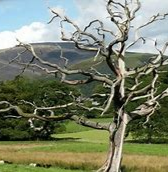 This week in our daily devotions, we will consider the activities of our Lord during Holy Week.
This week in our daily devotions, we will consider the activities of our Lord during Holy Week.
On Monday, Jesus and his disciples walked the two miles from Bethany to Jerusalem. Along the way he cursed a fig tree because it had failed to bear fruit. There are two lessons to glean from this story. First it represented God’s judgment on spiritually dead religious leaders. In 2 Timothy 3:5 Paul warned Timothy of people with a “form” of godliness, but they deny the power. They go through the motions and maintain all the external form of religion, but know nothing of the power of God to genuinely change lives. Paul told Timothy to “turn away” from such people. In these troubling times, I pray for our community to find in the Church a true representation of the love and power that Almighty God has to offer. Secondly, He used this experience to illustrate the power of prayer and faith. According to Matthew 21:19 immediately after He cursed the tree it “withered away.” Jesus followed this up with the admonition “whatever things you ask when you pray, believe that you receive them and you will have them” (Mark 11:24).
In Jerusalem He returned to the Temple and saw two offenses. First, animals were being sold for sacrifices at exorbitant prices, and secondly, foreign money exchanged for temple gifts were subject to taxes and a high exchange rate. Both of these offenses were for the financial benefit of the priests and Pharisees. In anger, Jesus overturned tables and drove the money changers out, saying “The Scriptures declare, ‘My Temple will be a house of prayer,’ but you have turned it into a den of thieves” (Luke 19:46).
I can’t help but see a parallel between Jesus cursing a barren fig tree and rebuking religious leaders for failing the people while padding their bank accounts. God wanted the temple to be a house of prayer for all people, not just the wealthy. He still does.
Let me encourage you, that in a culture of spiritual barrenness, we can be believers who take God at His word, pray in faith, and believe Almighty God to do the miraculous.
Scriptures for Monday: Matthew 21:12–22, Mark 11:15–19, Luke 19:45-48, and John 2:13-17.
by Jim Brummett | Apr 2, 2020 | Devotions
.Romans 1:8 First, I thank my God through Jesus Christ for you all, that your faith is spoken of throughout the whole world.
One of the greatest memories I have from our recent trip to Israel was the time spent in reading the word, worship and prayer with fellow believers. The number of people in Israel who are followers of Christ are few, which means relationships between believers is precious and appreciated.
In our condo in Jerusalem we read scripture, sang and prayed before visiting the Mount of Olives. In the days that followed we also read the scriptures at places like Beth-Shemesh where the Philistines returned the Ark of the Covenant to the Jews (1 Samuel 6), and the Valley of Elah where David killed Goliath (1 Samuel 17). Sharing these times of worship and prayer with Gina’s cousins Jeanie, Scott, and Laura were precious. Scott and Laura lived in Israel for nine years, pastoring and planting churches. We had the privilege of participating in a Bible study and prayer meeting in one of those churches, in the city of Qiryat Shemona, located near the Lebanese border. To the best of our knowledge it is the only Christian congregation north of the Sea of Galilee. You can imagine our relief when they opted to speak in English rather than Hebrew during our meeting.
The pastor’s name is Israel, the gentleman in the white shirt standing to my right in the photo, and his wife Marci is the lady in the green dress on the far left of the photo. Israel’s father was a rabbi. When Israel came to Christ he was the first Christian in his village. Standing to his right is Daniel from the village of Metula located on the Lebanese border. He and his wife are the only believers in their community. Daniel has a gentle spirit and a genuine love for God and the Bible. The gentleman in the cowboy hat is Zach, from Pastor Robert Morris’ church in Texas. Zach moved to Israel years ago, and attended the church Scott and Laura planted in Tel Aviv. He is a gifted carpenter who used his skills to paint and remodel the church building. Others were from South Africa and Lithuania.
I can’t tell you the theology of those I worshipped with that night, other than they all believed in Jesus Christ the Son of God who died on the cross for our sins; they believed in the authority of God’s Word and they believed in the power of prayer.
Pastor Israel led an hour-long discussion on the scriptures, and afterward we spent an hour in prayer. Brothers and sisters whom we met only an hour before prayed aloud for Gina’s brother Ron who is in Craig Hospital paralyzed from a motorcycle accident. They prayed for Gina and me and our congregation, and they prayed for their friends and relatives who are not saved. We were deeply moved, knowing “the fervent prayer of a righteous man accomplishes much” (James 5:16). As we prayed, the sweet aroma of the presence of the Holy Spirit filled that place. Oh, how it filled that place and our hearts.
I am praying for the presence of the Holy Spirit to fill your hearts and homes and you spend time with Him in your prayer closet.
Let’s sing: O come to the altar, the Father’s arms are open wide…
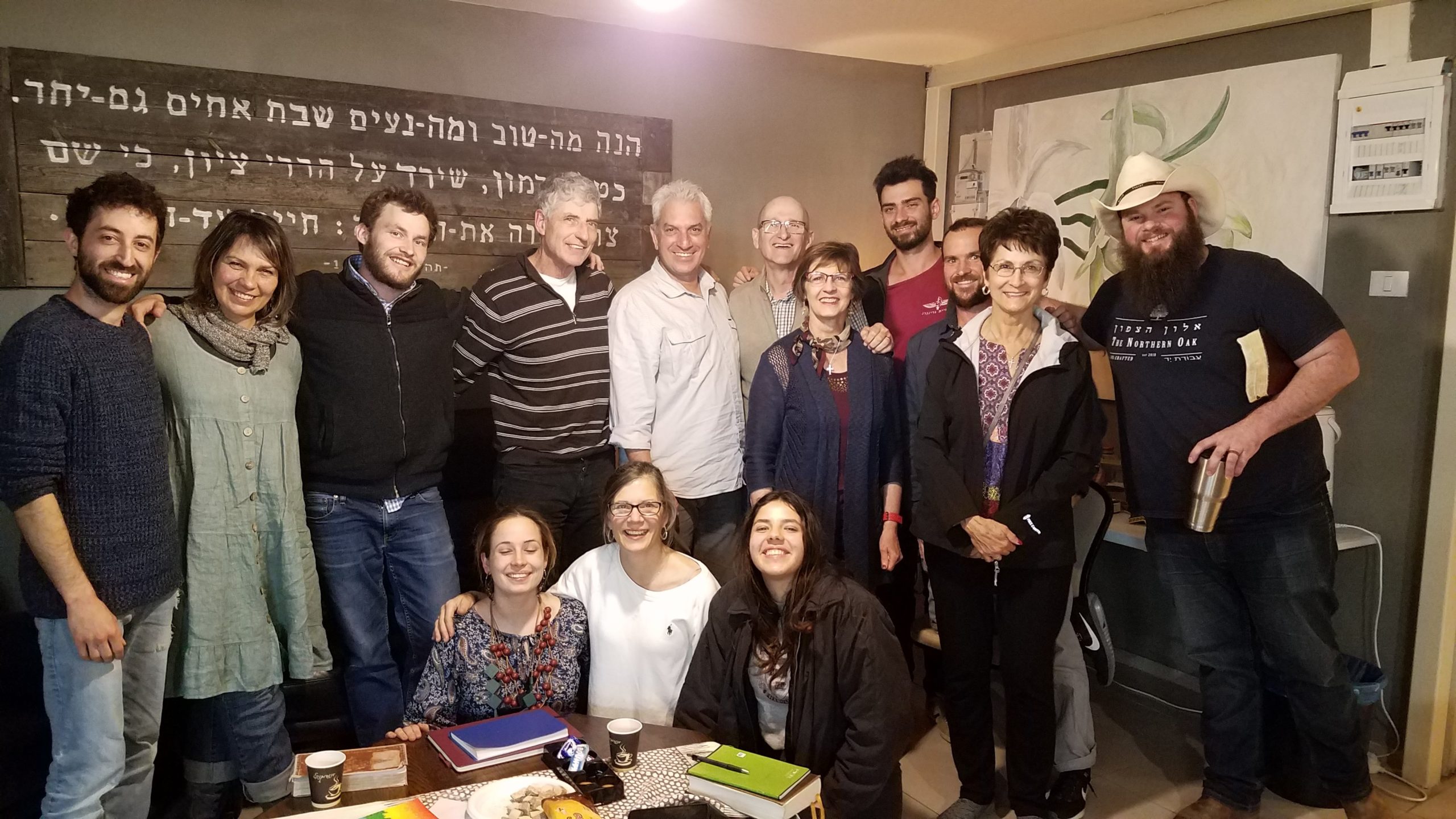
 Friday of Holy Week was a day of death. Early Friday morning, Judas, overcome with remorse for betraying our Lord, hanged himself.
Friday of Holy Week was a day of death. Early Friday morning, Judas, overcome with remorse for betraying our Lord, hanged himself.

 On Tuesday of Holy Week, Jesus returned to Jerusalem, passed the withered fig tree and used it as an illustration of the power of placing our faith in God. When they returned to the Temple, religious leaders publicly challenged him, asking “By what authority are you doing these (miracles)? And who gave you this authority?” (Matthew 21:23). That conversation did not go well for the leaders, as Jesus called them “blind guides…whitewashed tombs full of dead people’s bones and all sorts of impurity, filled with hypocrisy and lawlessness…” (23:24-33). Notice, He did not try to defend himself nor give credence to his critics. There is probably a lesson there for us today. A little while later that day, Judas negotiated with the Sanhedrin to betray Jesus (Matthew 26:14-16).
On Tuesday of Holy Week, Jesus returned to Jerusalem, passed the withered fig tree and used it as an illustration of the power of placing our faith in God. When they returned to the Temple, religious leaders publicly challenged him, asking “By what authority are you doing these (miracles)? And who gave you this authority?” (Matthew 21:23). That conversation did not go well for the leaders, as Jesus called them “blind guides…whitewashed tombs full of dead people’s bones and all sorts of impurity, filled with hypocrisy and lawlessness…” (23:24-33). Notice, He did not try to defend himself nor give credence to his critics. There is probably a lesson there for us today. A little while later that day, Judas negotiated with the Sanhedrin to betray Jesus (Matthew 26:14-16). This week in our daily devotions, we will consider the activities of our Lord during Holy Week.
This week in our daily devotions, we will consider the activities of our Lord during Holy Week.